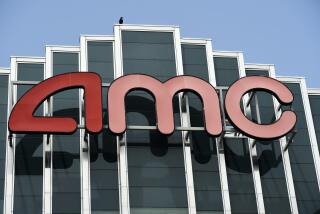Company Town : HOLLYWOOD GIANT FOR SALE? : MCA, the Sequel : Matsushita Mulls Whether to Sell; Seagram Emerges as Likely Suitor
- Share via
Matsushita Electric Industrial Co. is likely to decide within two weeks whether it will sell MCA Inc.--with Seagram Co. emerging as the front-runner--although executives close to the situation cautioned that chaos in the currency markets could postpone any deal.
The possibility of who might buy the venerable MCA entertainment conglomerate, which owns Universal Pictures, was Hollywood’s obsession--and frustration--Monday. In a town where executives pride themselves on their information-gathering skills, most were left speculating on possible scenarios without any hard details.
Executives familiar with the talks said the situation is changing virtually by the hour and that the dollar’s free fall against the yen--and the Clinton Administration’s vows to defend the dollar--could prove an incentive to Matsushita to wait until things settle down.
Senior MCA executives privately acknowledge that Matsushita has kept them out of the loop, a decision that has worsened an already-tense relationship with the Osaka-based company, which purchased MCA in 1990 for $6.6 billion.
Several executives described as “disgraceful” the fact that Chairman Lew Wasserman, probably the most-revered executive in town, and President Sidney Sheinberg would be kept in the dark about any talks.
While Hollywood bubbled, homeowners in neighborhoods surrounding MCA’s sprawling entertainment complex in Universal City were speculating Monday on the impact such a sale might have on them. MCA recently announced its intention to seek local government approval of a 25-year-plan that would double development on its 415-acre property at the north end of the Cahuenga Pass, adding four hotels, offices, restaurants, film production facilities and theme park attractions.
Opponents of the expansion, who have organized into a group called the Alliance Against MCA/Universal Expansion, would prefer to see MCA build high-tech, high-wage production facilities rather than noisy, traffic-generating hotels or theme park rides.
“If the bottom line is the only thing that matters to the buyer, then they will probably abandon the least productive business--the back lot operation,” said Gerald Silver, an Encino homeowners group leader who helped to organize the coalition.
“We obviously would prefer a buyer that wants good long-term relations with its neighbors and will contribute to our skilled-job base. We don’t want to see a huge invasion of outsiders who have no stake in our community.”
Neither Seagram nor Matsushita would confirm that any talks have taken place. Matsushita has said it is still considering what to do with MCA, a departure from previous declarations that it had no desire to sell.
Pointing to a deal with Seagram, however, are several factors.
First, the company is said to be considering divesting its 25% stake in DuPont, now worth about $10 billion. Analysts say that would give it the money required to buy MCA at a price starting at about that amount.
Seagram Chief Executive Edgar M. Bronfman Jr. enjoys close ties to a number of Hollywood figures, notably Creative Artists Agency Chairman Michael S. Ovitz, who helped orchestrate the original sale of MCA to Matsushita.
Bronfman has been frustrated with Seagram’s investment in Time Warner, where the company spent about $2 billion for a 15% stake that has remained stagnant in value. In addition, Time Warner has erected anti-takeover barriers in the wake of Bronfman’s investment.
Another intriguing factor is that Seagram’s chief financial officer, Stephen E. Banner, is intimately familiar with MCA, having worked on the original acquisition by Matsushita when he was a mergers and acquisitions lawyer at Simpson, Thacher & Bartlett.
That law firm is also said to be the driving force behind the latest talks, according to MCA executives. In addition, Banner advised Seagram when it bought its DuPont stake in the early 1980s.
One other factor pointing in Seagram’s direction is that Matsushita is said to be eager to make a deal that can close quickly and without static from shareholders or regulators. A deal with Bronfman, whose family controls Seagram, would fit that description.
Still, executives point out that Matsushita is under no pressure to sell and take an embarrassing loss. Indeed, the dollar has weakened so much against the Japanese yen that Matsushita would need to get $10.35 billion for MCA today to match what it paid.
“Something will either happen right away or nothing will happen at all,” one senior MCA executive said.
Some analysts, however, believe that Matsushita executives believe this is the optimum time to sell, with Hollywood studios in demand, as evidenced by Viacom’s $10-billion acquisition of Paramount Communications Inc.
Such a move would not be the embarrassment in Japan it once would have been, since the perception there now is that Hollywood investments were a bad idea in the wake of Sony’s debacle at Columbia and TriStar Pictures. Matsushita competitor Sony took a $2.7-billion write-off last fall stemming from its Hollywood investments.
With the currency flux, one possible scenario would be for Matsushita to sell a controlling interest in MCA, with payments for the remaining stake adjusted after the currency markets calm down.
European entertainment conglomerate PolyGram, which is controlled by Dutch electronics giant Philips, has been increasing its involvement in the movie business for several years and clearly would be interested in a deal to at least combine some of its operations with MCA.
But sources say Philips’ overtures have not gotten far with Matsushita.
Other speculation has included a group aligned with film mogul Barry Diller, although sources close to Diller deny that. The name of media baron Rupert Murdoch has also remained in the mix, although sources close to him suggest that serious discussions are not taking place now.
Cable giant Tele-Communications Inc. has downplayed its interest, and Germany’s Bertelsmann is no longer seriously considered a possible suitor.
Over the weekend, rumors spread that three regional phone companies--Bell Atlantic, Nynex and Pacific Telesis--were preparing a bid. The three are involved in a venture to form a new video project and are advised by Creative Artists Agency. But sources close to the companies said they are not involved.
MCA’s record has been mixed under Matsushita, though MCA executives bristled Monday at suggestions that the company has not been performing well.
It released such films as the huge hit “Jurassic Park” and saw a record performance by its music group, which includes highly profitable Geffen Records and a top country division. But the company has been plagued by reports that the budget on the Kevin Costner film “Waterworld,” due out this summer, has soared to $175 million.
*
Contributing to this report were Times staff writers Claudia Eller and Jon D. Markman in Los Angeles and David Holley in Japan.
* MATSUSHITA & FRIENDS
Japanese giants stumble with foreign subsidiaries. D4
* DEAL IN WORKS?
Seagram might sell its DuPont stake to finance MCA bid. D4
(BEGIN TEXT OF INFOBOX / INFOGRAPHIC)
What’s the Deal With MCA?
THE POTENTIAL SUITORS
A decision by Matsushita Electric Industrial to sell the MCA entertainment company could be made within two weeks, according to sources. Some possible buyers:
* Seagram: It has emerged as the front-runner in the wake of reports that it may divest its DuPont holdings, now worth about $10 billion. Chairman Edgar Bronfman Jr. has close ties to Hollywood. But a Seagram deal is complicated by the company’s ownership of about $2 billion in Time Warner stock.
* PolyGram: With the backing of Dutch electronics giant Philips, which owns 75% of PolyGram, the company has the money to make the deal. Sources say its overtures have gotten a cool reception from Matsushita.
* Rupert Murdoch: Sources close to Murdoch discount the speculation, but his name won’t disappear from the rumor mill. Murdoch would like MCA’s profitable music division, but skeptics note that he already has his Fox studio.
* Tele-Communications Inc.: Showed interest in the past but now downplays it.
? Some MCA executives believe a mystery suitor that has yet to emerge publicly, such as a wealthy international investor or a major U.S. company such as AT&T;, could be waiting in the wings.
A BRIEF HISTORY
* December, 1990: Matsushita Electric Industrial, a 77-year-old producer of home electronic products, purchases all shares of MCA for approximately $6.6 billion.
* Early 1993: Several MCA divisions, including music, recreation and home video, announce the company’s first comprehensive joint marketing effort to promote the blockbuster movie “Jurassic Park.”
* March, 1993: Calling the deal the “largest television production project in the history of first-run syndication,” MCA executives announce a package of 24 made-for-television action movies.
* Fall of 1994: Steven Spielberg’s “Jurassic Park” surpasses “E.T. the Extra Terrestrial,” as the highest-grossing film of all time.
* October, 1994, to present: Disagreements between MCA and Matsushita over strategy issues boil over into a public squabble. The two sides attempt to work out their differences but no progress is reported. Separately, MCA is plagued by reports that the budget of “Waterworld” has soared to $175 million.
THE DOLLAR’S NOT WHAT IT USED TO BE
What the increasing value of the yen has done to MCA’s original $6.6-billion purchase price and how many dollars it would take to recoup the yen today:
Billions of yen:
$6.6 billion was worth 891.79 billion yen in 1990. On Monday, it was worth 568.46 billion yen.
Billions of dollars:
If Matsushita wants its 891.79 billion yen, MCA’s purchase price needs to be $10.35 billion.
Note: Figures based on December exchange rates for each year. Matsushita bought MCA on Dec. 28, 1990.
Sources: TradeLine, Times reports. Researched by JENNIFER OLDHAM and DAVID NEIMAN / Los Angeles Times
More to Read
Inside the business of entertainment
The Wide Shot brings you news, analysis and insights on everything from streaming wars to production — and what it all means for the future.
You may occasionally receive promotional content from the Los Angeles Times.










